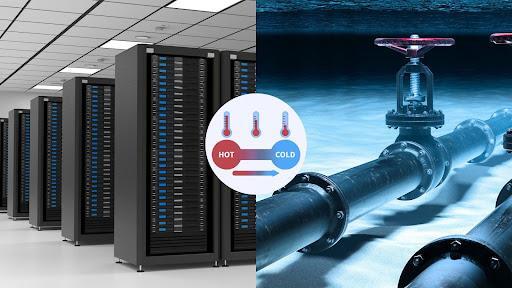
IIT Bombay Study Finds Deep Seawater Cooling Cuts Data Costs
The digital landscape is constantly evolving, with data centers playing a crucial role in powering our daily lives. However, the ever-growing demand for data storage and processing has a significant environmental impact, with data centers accounting for a substantial portion of global energy consumption. In a groundbreaking study, researchers at IIT Bombay have discovered a revolutionary method to reduce energy costs and emissions by harnessing the natural cold of the deep ocean. This innovative approach, known as Deep Seawater Cooling (DSWC), has the potential to transform the data center industry, offering a robust, economically viable, and environmentally crucial solution for our expanding digital footprint.
The Problem: Energy Consumption and Emissions
Data centers are the backbone of modern computing, handling vast amounts of data and facilitating communication, entertainment, and commerce. However, their massive energy consumption and subsequent emissions have become a significant concern. According to the Natural Resources Defense Council, data centers in the United States alone consume over 2% of the country’s total electricity, with emissions equivalent to those of a small country like Belgium.
The environmental impact of data centers is staggering, with the digital sector accounting for around 1% of global greenhouse gas emissions. As the demand for data storage and processing continues to grow, the energy consumption and emissions of data centers are expected to increase exponentially. It is imperative to find a sustainable solution to reduce the environmental footprint of data centers.
Deep Seawater Cooling: A Revolutionary Approach
The IIT Bombay study, published in the Journal of Cleaner Production, presents an innovative solution to tackle the energy consumption and emissions of data centers. The researchers have developed a system that harnesses the natural cold of the deep ocean to cool data centers, reducing the need for traditional air conditioning systems. This approach is known as Deep Seawater Cooling (DSWC).
DSWC involves pumping seawater from the depths of the ocean (typically between 1,000 to 3,000 meters) through a network of pipes to a data center. The cold seawater is then used to cool the data center’s servers, reducing the need for traditional air conditioning systems. The warmed seawater is then discharged back into the ocean, where it can be re-circulated.
Benefits of DSWC
The IIT Bombay study reveals that DSWC can offer numerous benefits, including:
- 79% Energy Savings: By harnessing the natural cold of the ocean, DSWC can reduce energy consumption by up to 79%, leading to significant cost savings.
- Emission Cuts: The reduction in energy consumption translates to a substantial decrease in emissions, making DSWC an environmentally friendly solution.
- Eight-Month Payback: The study estimates that DSWC can offer a payback period of just eight months, making it a viable investment for data center operators.
- Robust and Reliable: DSWC is a robust and reliable system that can operate continuously, ensuring minimal downtime and maximum efficiency.
Challenges and Future Directions
While DSWC has the potential to revolutionize the data center industry, there are several challenges that need to be addressed:
- Corrosion and Biofouling: The seawater used in DSWC can corrode equipment and promote biofouling, which can reduce system efficiency.
- Scalability: DSWC systems need to be designed to accommodate large data centers, which can be a significant challenge.
- Cost: While DSWC can offer significant energy savings, the initial investment costs may be higher than traditional cooling systems.
To overcome these challenges, researchers and industry experts are working together to develop more efficient and cost-effective DSWC systems. The development of new materials and technologies can help reduce corrosion and biofouling, while advances in system design can improve scalability and efficiency.
Conclusion
The IIT Bombay study on Deep Seawater Cooling has the potential to transform the data center industry, offering a sustainable, economically viable, and environmentally crucial solution. By harnessing the natural cold of the ocean, DSWC can reduce energy consumption and emissions, while providing a robust and reliable cooling system. As the digital landscape continues to evolve, it is essential that we adopt innovative solutions like DSWC to mitigate the environmental impact of data centers.
Source:






